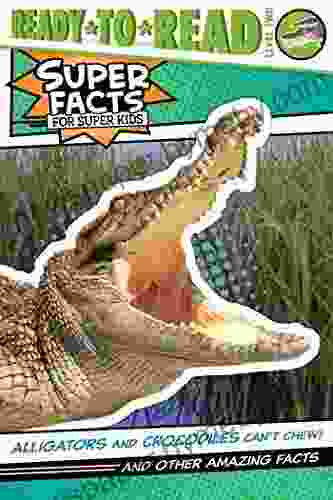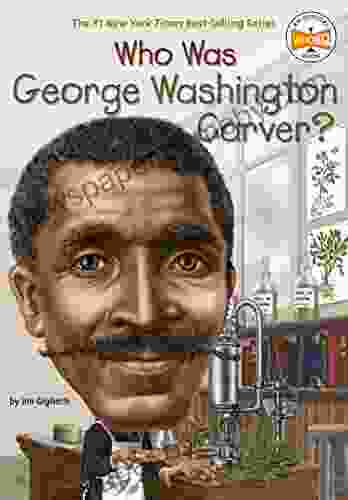Who Was George Washington Carver? The Extraordinary Life of an American Inventor, Scientist, and Humanitarian

4.9 out of 5
| Language | : | English |
| File size | : | 50757 KB |
| Text-to-Speech | : | Enabled |
| Enhanced typesetting | : | Enabled |
| Word Wise | : | Enabled |
| Print length | : | 104 pages |
| Screen Reader | : | Supported |
George Washington Carver was an extraordinary American polymath whose scientific brilliance and unwavering compassion left an indelible mark on the world. Born into slavery in 1864, Carver overcame adversity to become a renowned inventor, scientist, and humanitarian. His groundbreaking discoveries in agricultural science, particularly his research on peanuts and soybeans, revolutionized farming practices and improved the lives of countless people around the globe.
Early Life and Education
Carver was born on a plantation near Diamond Grove, Missouri, on January 1, 1864. As a slave child, he witnessed the horrors of slavery and endured hardships that would have broken many. Despite the adversity he faced, Carver displayed an insatiable thirst for knowledge and a remarkable ability to learn. He taught himself to read and write, and eventually attended Simpson College in Indianola, Iowa, where he excelled in his studies.
Scientific Career at Tuskegee Institute
In 1896, Carver joined the faculty of Tuskegee Institute in Alabama, where he established an agricultural research program that would become a hub of innovation. For over four decades, Carver dedicated his life to unlocking the potential of peanuts and soybeans, two crops that were widely grown in the South but were considered low-value commodities. Through meticulous experiments and tireless research, Carver discovered over 300 uses for peanuts, including peanut butter, ink, soap, and cosmetics. He also developed innovative farming techniques that increased crop yields and improved soil fertility.
Agricultural Innovations and Economic Empowerment
Carver's agricultural innovations had a profound impact on the lives of African American farmers. He taught them how to diversify their crops, rotate their fields, and improve their soil quality. Carver's research and advocacy helped the South overcome its economic dependence on cotton and created new opportunities for black farmers to succeed.
Social Justice and Humanitarian Efforts
Beyond his scientific achievements, Carver was deeply committed to social justice and humanitarian work. He actively fought against racism and advocated for the rights of African Americans. He established the George Washington Carver Foundation to support young scientists and provide scholarships to underprivileged students. Carver's legacy extends far beyond his scientific discoveries; he remains an inspiration for generations to come.
Legacy and Impact
George Washington Carver died on January 5, 1943, at the age of 78. His life and work have left an enduring legacy that continues to inspire people around the world. His groundbreaking scientific discoveries revolutionized agriculture and improved the lives of countless people. His unwavering compassion and dedication to social justice have made him an icon of humanity and a role model for generations to come.
George Washington Carver was an extraordinary American inventor, scientist, and humanitarian whose life and work left an indelible mark on the world. From his humble beginnings as a slave child to his groundbreaking discoveries and humanitarian efforts, Carver's story is a testament to the power of resilience, innovation, and compassion. His legacy continues to inspire and motivate people around the globe, reminding us of the transformative power of a single life dedicated to the betterment of humanity.
4.9 out of 5
| Language | : | English |
| File size | : | 50757 KB |
| Text-to-Speech | : | Enabled |
| Enhanced typesetting | : | Enabled |
| Word Wise | : | Enabled |
| Print length | : | 104 pages |
| Screen Reader | : | Supported |
Do you want to contribute by writing guest posts on this blog?
Please contact us and send us a resume of previous articles that you have written.
 Book
Book Novel
Novel Page
Page Chapter
Chapter Text
Text Story
Story Genre
Genre Reader
Reader Library
Library Paperback
Paperback E-book
E-book Magazine
Magazine Newspaper
Newspaper Paragraph
Paragraph Sentence
Sentence Bookmark
Bookmark Shelf
Shelf Glossary
Glossary Bibliography
Bibliography Foreword
Foreword Preface
Preface Synopsis
Synopsis Annotation
Annotation Footnote
Footnote Manuscript
Manuscript Scroll
Scroll Codex
Codex Tome
Tome Bestseller
Bestseller Classics
Classics Library card
Library card Narrative
Narrative Biography
Biography Autobiography
Autobiography Memoir
Memoir Reference
Reference Encyclopedia
Encyclopedia Jo Nesbo
Jo Nesbo Zara Fagen
Zara Fagen John Macgregor
John Macgregor Ken Ilgunas
Ken Ilgunas Mark J Price
Mark J Price Patricia Hubbell
Patricia Hubbell Jim Mccarthy
Jim Mccarthy John Gilstrap
John Gilstrap John Brockman
John Brockman Rather Mcsilly
Rather Mcsilly Joe Saul Sehy
Joe Saul Sehy Joanne Rossmassler Fritz
Joanne Rossmassler Fritz Jim Forest
Jim Forest Robert S Kaplan
Robert S Kaplan Traci Gormley
Traci Gormley Julia E Clements
Julia E Clements Susan D Sharp
Susan D Sharp Len Goodman
Len Goodman Joel Levitt
Joel Levitt Jodi Magness
Jodi Magness
Light bulbAdvertise smarter! Our strategic ad space ensures maximum exposure. Reserve your spot today!

 Salman RushdieExplore the Wonders of the World with "And Other Amazing Facts: Ready to Read...
Salman RushdieExplore the Wonders of the World with "And Other Amazing Facts: Ready to Read... Craig BlairFollow ·6.6k
Craig BlairFollow ·6.6k Luke BlairFollow ·15.9k
Luke BlairFollow ·15.9k Junot DíazFollow ·5.2k
Junot DíazFollow ·5.2k Grant HayesFollow ·6.3k
Grant HayesFollow ·6.3k Gordon CoxFollow ·9.4k
Gordon CoxFollow ·9.4k Roger TurnerFollow ·10.5k
Roger TurnerFollow ·10.5k Samuel WardFollow ·18.1k
Samuel WardFollow ·18.1k Avery SimmonsFollow ·15.6k
Avery SimmonsFollow ·15.6k

 Jermaine Powell
Jermaine PowellThe Ultimate Guide to Unlocking Consistent Profitable...
Introducing the 2nd Edition of the...

 Yasunari Kawabata
Yasunari KawabataMinute Microskills Videos: The Ultimate Guide for Visual...
Unlock Your Potential with Bite-Sized Video...

 Nathan Reed
Nathan ReedUnveiling the Wonders of Yosemite through John Muir's...
Immerse yourself in the breathtaking beauty...

 Gabriel Garcia Marquez
Gabriel Garcia MarquezWhen You Find Me Novel: A Gripping Mystery Unravels
In the sleepy...

 Esteban Cox
Esteban CoxMountains of California: An Essential History of...
From the towering...

 Devin Ross
Devin RossComm Check: Unveiling the Heartbreaking Final Flight of...
Comm Check: The Final Flight of Shuttle...
4.9 out of 5
| Language | : | English |
| File size | : | 50757 KB |
| Text-to-Speech | : | Enabled |
| Enhanced typesetting | : | Enabled |
| Word Wise | : | Enabled |
| Print length | : | 104 pages |
| Screen Reader | : | Supported |










